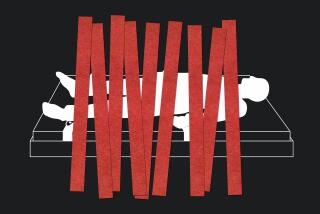Warning Signs of Abusive Restraints
- Share via
When considering the use of restraints, weigh potential benefits such as safety and comfort against potential negatives including the loss of mobility, depression and anxiety, says the Nursing Home Coalition of New York State.
In addition, family members and nursing home residents should watch for these signs of possible abuse of physical restraints:
* Discoloration: Is there redness, bruising, blanching or welts?
* Pain: Do the restraints cause pain in wrists, waist, chest or feet?
* Behavior: Is there squirming in an attempt to get comfortable? Does the resident bend forward trying to loosen restraints or rock back and forth?
People trying to choose a nursing home can gather important information by relying on their senses. Sarah Burger of the National Citizens’ Coalition for Nursing Home Reform suggests considering these factors:
* Sight: How do residents look? Are they up, dressed, clean, chatting among themselves and staff, or slumped in a wheelchair? Do rooms look personal or institutional?
* Sound: Is there a general level of chatter as in a normal household? Or is there noise blaring from the TV and cries of, “Help,” or, “Nurse”?
* Smell: Does the home smell good or does it smell of urine or a cover-up of heavy disinfectant? Does the food from the kitchen smell good?
* Taste: Eat a meal if you can. If not, ask residents how the food is. Are they eating it?
* Touch: Are handrails, bathrooms, etc., clean to the touch? Residents will reach out to you. Take their hands. Are they clean, with well-lubricated skin and trimmed nails, or are the hands sticky or dry, with ragged nails?
Also ask about quality of care and payment policies, the coalition says.
* Quality of care: Ask residents and their families, physicians, clergy and others what they think about various facilities. Visit as many nursing homes as possible. Find out about staff. Is there a trained social worker and a trained activities director? Do they have assistants? How does the home handle potential staffing shortages? Does staff turn over quickly?
* Payment: Most nursing home residents, even if they pay privately when they enter, run out of money. Unless someone is sure that they can pay indefinitely with private funds, they should choose a home that accepts Medicaid, find out what their state’s Medicaid eligibility rules are, and what their rights are or will be as a Medicaid nursing home resident.
Contact your state Office on Aging to get the name and telephone number of the nearest long-term care ombudsman program. Ombudsmen are empowered by law to serve as advocates for nursing home residents and to assist with complaints.






